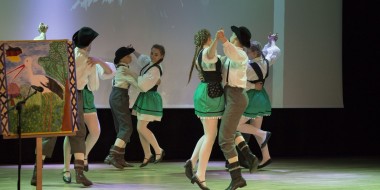
2011 There were 2,418 German nationals living in Lithuania, most of them in Klaipėda and Šilutė, as well as in Tauragė, Vilnius and Kaunas.
HISTORICAL LINKS. The appearance of the first German settlements in the historical lands of Lithuania is associated with the expansion of the Teutonic Order in the 13th century. to East Prussia and Klaipeda region (old inhabitants of Klaipeda region – memelenders). From the 14th century German craftsmen and merchants started moving to Lithuania. The Germans served in the palace and office of the Grand Duke, and were counselors, clerks and secretaries of the Dukes. Many eminent personalities of German origin worked for Lithuania: scientist Theodor Grotus, writer and playwright Herman Zuderman, writer Johannes Bobrovsky, poet Simon Dach, polyglot George Zauervein and others. A memorial exposition has been set up in Macikai village, where writer Herman Zuderman was born and lived, in Šilutė district. The writer Johannes Bobrovsky Museum was established in Vilkyškiai (Pagėgiai Municipality) and Simon Dach Fountain was restored in Klaipėda Theater Square.
PUBLIC ORGANIZATIONS. 1988 The first Lithuanian German cultural organization was established, which deals with the issues of culture, education and religion of the German-born population of Lithuania. Since 1996 There is a German Culture Center in Šilutė and the Klaipėda German Community Center – Simon Dach House. The activities of the centers are aimed at maintaining the German national identity, fostering the traditions and customs of the German nation, and developing mutual understanding between Lithuanians and Germans. Currently there are about 16 German organizations: Vilnius German Community, Klaipėda German Community, Kaunas German Cultural Society Kulturverband, Šilutė District German Community Heide, Marijampolė German Community, Edelweiss-Wolfskinder German Community Prussian descendants who came to Lithuania in the postwar and found refuge there, and others. NGOs implement cultural programs, organize meetings, seminars, friendship evenings, introduce German culture, develop intercultural dialogue. The annual German Culture Days held in Klaipeda have become a tradition. In areas where there are more numerous German organizations, religious communities, there are German artistic amateur groups, mainly choirs. Since 2008 the Baltic German choir festivals are organized. Lithuanian German art groups participate in the events of the national minority culture days. The choirs of the German communities of Klaipėda region go to the meetings and festivals organized by the Germans (former inhabitants of East Prussia) in Germany. Social activities are also being developed by the Evangelical Lutheran and Evangelical Reformed religious communities in the country. The German Language Teachers ‘and Teachers’ Association, the Lithuanian Reformation Historical and Cultural Society, the Lithuanian-German Forum and others are operating.
EDUCATION. There are 3 Sunday German schools in Lithuania, where children and young people are given the opportunity to learn German, to know and cherish German traditions and culture. This is the Sunday School for Children of the German Cultural and Educational Center, the Sunday School for Children of the Kaunas German Cultural Society and the German Class of the Visaginas National Communities Center “Native School”. In cooperation with the Goethe Institute, Sunday School pupils are offered opportunities to attend celebrations and competitions organized by the Institute.
MEMORY DAYS. German Germans commemorate German unification day (October 3).
RELIGION. Most Germans in Lithuania belong to Evangelical Lutheran and Evangelical Reformed religious communities. During the period of independence, prayer houses were returned to the faithful.
DISHES. German cuisine is dominated by saturated, fatty but not spicy food.



